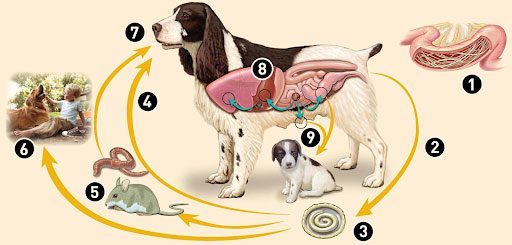In today’s fast-paced world, where people are burdened by invisible pressures from life, having a companion like a dog or cat is increasingly becoming a trend.
Infection from dog and cat roundworms is a zoonotic disease caused by canine roundworm (Toxocara canis) or feline roundworm (Toxocara cati). These roundworms, commonly known as dog and cat roundworms, lay eggs that are excreted in feces into the environment. After 1-2 weeks, these eggs become embryonated, which is the stage that can cause illness in humans if ingested.
Currently, approximately 1.4 billion people worldwide are infected with canine roundworms. In Vietnam, while this disease has not been extensively studied, the seroprevalence of Toxocara infection in dogs and cats is quite high (20.6 – 40%). Symptoms can range from asymptomatic infections to serious organ damage, affecting the liver, eyes, brain, lungs, and more.
Symptoms of Infection from Dogs and Cats
In most cases, infection with roundworm larvae from dogs and cats does not cause symptoms, and the parasites typically die within a few months. However, some individuals may experience mild symptoms such as: cough, low-grade fever, occasionally high fever, headaches, or abdominal pain.
In rare cases, the larvae can infect organs such as the liver, lungs, eyes, or brain, leading to severe symptoms like: fatigue, loss of appetite or weight loss, itchy skin, blurred vision or cloudiness, often affecting only one eye, etc.

The lifecycle of roundworms in dogs and cats.
Canine and feline roundworm infections can cause damage to various organs such as: the liver, lungs, central nervous system, or eyes. Furthermore, the disease can lead to numerous complications including: itchy rashes, hives, gastrointestinal disorders, prolonged fever, seizures, and strabismus. Therefore, it is crucial to seek medical attention promptly if symptoms arise for timely diagnosis and treatment.
Some Preventative Measures
To prevent infection, it is essential to: eat cooked food, drink clean water, wash fruits and vegetables thoroughly before consumption, and regularly wash hands with soap after playing with dogs or cats, after handling soil, and before eating or drinking. In addition to vaccinating pets against common diseases, deworming them is particularly important.
Puppies and kittens should be dewormed starting from 3 weeks of age, followed by three additional treatments every two weeks. After that, routine deworming should be done every six months.

Wash hands with soap after playing with dogs and cats.
Do not allow dogs to roam freely or defecate indiscriminately, especially in areas like schools, playgrounds, and parks.
Weekly, it is important to keep your pet’s living area clean. Their feces should be buried or placed in a bag and disposed of in the trash.
Additionally, raising awareness and educating the public about roundworm infections from dogs and cats is very important, contributing to improved personal hygiene and health protection, aimed at reducing the incidence and transmission of the disease within the community.


















































